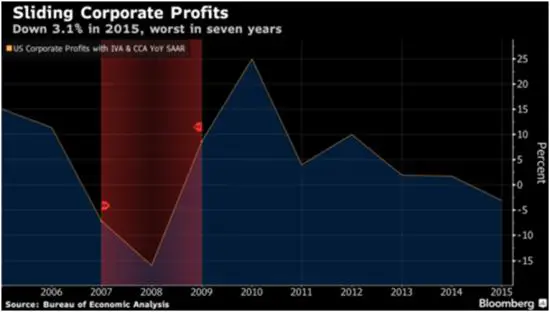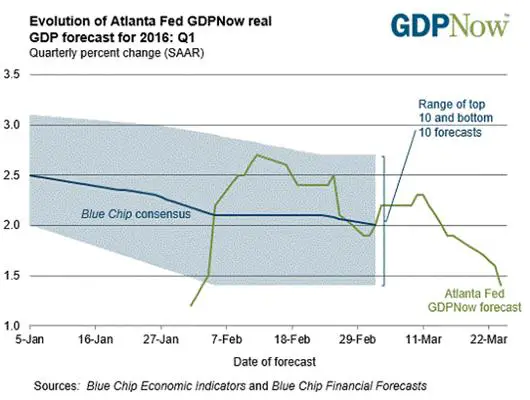Talk about diminished expectations. This morning’s estimate of 1.4% Q4 GDP growth is being hailed as a pleasant surprise. Which is odd, considering that for most of the past century a number this low would have been seen as weak enough to require emergency action.
And that’s just the headline number. Dig a little deeper and the picture — at least when viewed through a non-Keynesian lens — is of a system in crisis. Consider:
Corporate profits are, as today’s Bloomberg puts it, sliding.
Meanwhile (also from Bloomberg),
A firm labor market and low inflation encourage households to keep shopping. Today’s fourth-quarter growth figure reflected more spending on services, particularly on recreation and transportation. “It’s really U.S. consumers who are powering the global economy forward at this point,” said Gus Faucher, an economist at PNC Financial Services Group Inc. in Pittsburgh.
But if companies are earning less money, how likely is it that they’ll step up hiring going forward? Not very. And since today fewer Americans have full time jobs than in 2007 (making the current stellar 4.9% unemployment rate look like a cruel joke) a new round of mass layoffs will make the job market even more dire for anyone hoping to support a family with full-time work.
“If profits remain depressed, the prospects for capex and hiring will come under greater pressure,” Sam Bullard, a senior economist at Wells Fargo Securities LLC in Charlotte, North Carolina, wrote in a research note.
What are the chances of profits remaining depressed? Pretty good, considering that two of the big growth drivers of the past few years have been student debt and car loans. The former is, as everyone by now knows, at levels that consign a whole generation of kids to life in their parents’ basements — not a recipe for robust consumption.
Car loans, meanwhile, are starting to look like subprime mortgages circa 2006:
Unpaid subprime car loans hit 20-year high
(CNN Money) – Americans with lower credit scores are falling behind on auto payments at an alarming pace.
The rate of seriously delinquent subprime car loans soared above 5% in February, according to Fitch Ratings. That’s worse than during the Great Recession and the highest level since 1996.
It’s a surprising development given the relative health of the overall economy. Fitch blames it on a dramatic rise in loans with lax borrowing standards that have helped fuel the recent boom in auto sales. More Americans bought new cars last year than ever before and the amount of auto loans soared beyond $1 trillion.
Fitch points out that the subprime end of the market is where there’s increased competition to peddle loans. The ratings firm flagged an increase in loans to “borrowers with no FICO scores,” lower downpayments, and extended term lending.
Toss in contracting global trade, turmoil in Europe and Latin America, and a grinding multi-month decline in US manufacturing output and the year ahead doesn’t look any better. Here’s the Atlanta Fed’s GDPNow measure of current growth, which shows a huge drop in just the past month:
What does all this mean? Very simply, if you borrow too much money life gets harder and the things that used to work stop working. For a country, lower interest rates no longer induce businesses and individuals to borrow and spend, and government deficits no longer translate directly into more full-time private sector jobs. Growth slows, voters get mad, politics gets crazy, and generally bad times ensue. The only question is why this is a surprise to the people whose choices brought us to the edge of the abyss.




20 thoughts on "Bad — But Better Than What’s Coming"
It’s funny or quite disturbing depending on your view that this site and its editor have never actually read Keynes or even studied it to some extent. Keynes never advocated going off the gold standard or believed in corporate bailouts and advised Winston Churchill that it would be a mistake to go off the gold standard. Even after we went off of it he advised our government on how to make it work. This conception about Keynes is driven by right-wing think tanks(Kochs) that use 501C3, C4s, and C6s that fund groups to sell their propeganda to the goveernment and the public advocating their don’t tax the rich or regulate the corporation rhetoric using false and slanted infroamtion that when looked into proves that what they are selling are lies and distortions of economics and laws.
Buy gold and silver, because the only thing that’s for certain is paper money will get spent.
The fastest rising category in consumer spending is health care expenditures (think of mandatory health insurance). In fact, health care expenditures now contribute 17.5% of GDP. What a nice way to keep GDP from dipping below zero. Without spending so much of our national revenue simply on rising health insurance costs during the last 12 months….who knows…we may have suffered a couple consecutive quarters of negative GDP growth, ie, an official recession. And then what would our prestigious Federal Reserve do in response?
The fed bankers , in my opinion, work in conjunction with their puppet, “BARRY” to intentionally destroy America for the” NWO”.. pure evil is all around us…
Are you confusing Barry with George or is it you are just looking out your ass?
Your dumber than you look……..
I agree with “Bill Johns”, who says “they’re” surprised? I actually think what’s more accurate is they think everything is going fine. Check out this absurd article entitled “Economic data could put stocks back on a higher path”
https://www.fidelity.com/news/article/top-news/201603260111RTRSNEWSCOMBINED_KCN0WQ2BI_1
Play with FIRE and you will get burned…
” The only question is why this is a surprise to the people whose choices brought us to the edge of the abyss.” A vivid demonstration of the difference between intelligence and wisdom. I make the simple assumption that the Fed members are intelligent enough to get the job, but lack the wisdom to do what is right for the good of the country.
What makes you think they are hired and paid to do what’s right for the good of the country. There’s a huge difference between indoctrination and education. They have been taught what to think instead of how to think.
It is correct what you say, but you make the wrong assumption that they want what it is good for this country. I agree that there is a big difference between intelligence and wisdom.
Of course you are right. Silly me for not catching that rather obvious false assumption.